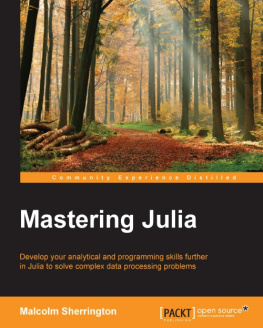Julia Lane - Democratizing Our Data: A Manifesto
Here you can read online Julia Lane - Democratizing Our Data: A Manifesto full text of the book (entire story) in english for free. Download pdf and epub, get meaning, cover and reviews about this ebook. publisher: MIT Press, genre: Politics. Description of the work, (preface) as well as reviews are available. Best literature library LitArk.com created for fans of good reading and offers a wide selection of genres:
Romance novel
Science fiction
Adventure
Detective
Science
History
Home and family
Prose
Art
Politics
Computer
Non-fiction
Religion
Business
Children
Humor
Choose a favorite category and find really read worthwhile books. Enjoy immersion in the world of imagination, feel the emotions of the characters or learn something new for yourself, make an fascinating discovery.

- Book:Democratizing Our Data: A Manifesto
- Author:
- Publisher:MIT Press
- Genre:
- Rating:5 / 5
- Favourites:Add to favourites
- Your mark:
- 100
- 1
- 2
- 3
- 4
- 5
Democratizing Our Data: A Manifesto: summary, description and annotation
We offer to read an annotation, description, summary or preface (depends on what the author of the book "Democratizing Our Data: A Manifesto" wrote himself). If you haven't found the necessary information about the book — write in the comments, we will try to find it.
Democratizing Our Data: A Manifesto — read online for free the complete book (whole text) full work
Below is the text of the book, divided by pages. System saving the place of the last page read, allows you to conveniently read the book "Democratizing Our Data: A Manifesto" online for free, without having to search again every time where you left off. Put a bookmark, and you can go to the page where you finished reading at any time.
Font size:
Interval:
Bookmark:
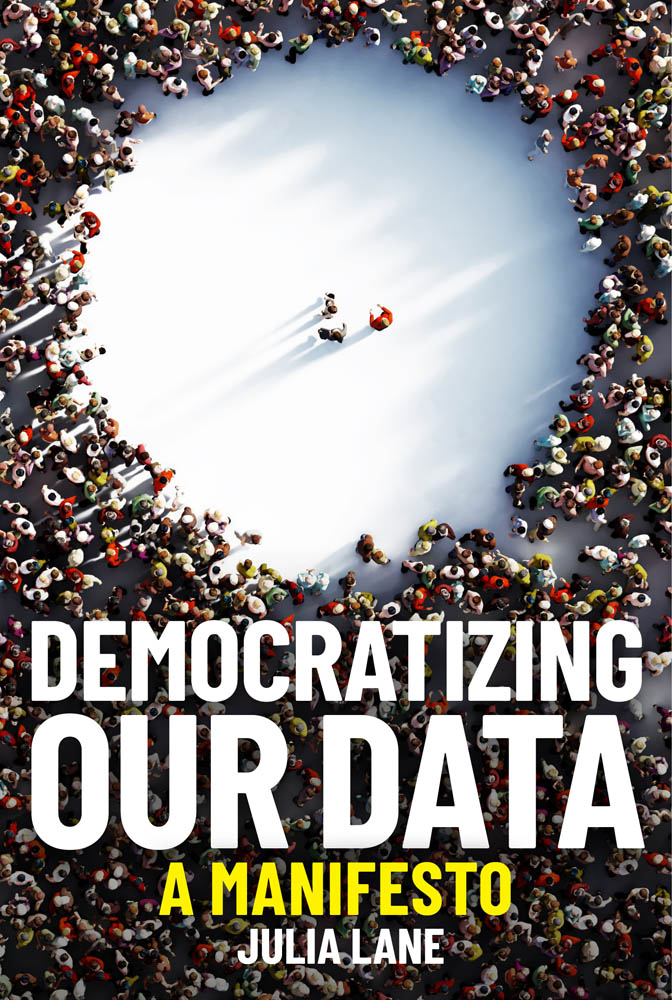
Julia Lane
The MIT Press
Cambridge, Massachusetts
London, England
2020 Massachusetts Institute of Technology
All rights reserved. No part of this book may be reproduced in any form by any electronic or mechanical means (including photocopying, recording, or information storage and retrieval) without permission in writing from the publisher.
Library of Congress Cataloging-in-Publication Data
Names: Lane, Julia I., author.
Title: Democratizing our data : a manifesto / Julia Lane.
Description: Cambridge, Massachusetts : The MIT Press, [2020] | Includes ibliographical references and index.
Identifiers: LCCN 2019057265 | ISBN 9780262044325 (hardcover)
Subjects: LCSH: United States--Statistical services--Standards. | Statistical decision--Standards. | Quantitative research--Standards.
Classification: LCC HA37.U55 L34 2020 | DDC 352.7/50973--dc23
LC record available at https://lccn.loc.gov/2019057265
10 9 8 7 6 5 4 3 2 1
d_r0
The Coleridge Initiative team: Past, Present, and Future
Not long ago I had lunch with one of the top statisticians in the country, who looked across the table and said, The information needs of people making important decisions are changing so rapidly. Its difficult for the federal government to meet those needsthe system is not designed for rapid change. We need to rethink how people can get consistently high-quality information when they need it from a trustworthy source. Our future depends on it. Another former government statistician put it more succinctly: The federal system is broken, and I dont know if anything can fix it. So many good people, and nothing ever changes. A colleague who has spent over thirty years working within the system believes the problem is that even when senior management knows what to do, there is no incentive to take big risks and rock the boat, so the safest thing for both managers and frontline staff is to continue doing what they have always done and make very small incremental changes. And that does not meet todays needs.
Think of the massive impact of the coronavirus on jobs and society in 2020. Governments at all levels urgently needed numbers that could tell them how many jobs were lost and how the most vulnerable in society were affected; the infrastructure was not there.
This book is intended to drive change in the system that the United States uses to produce public statistics. It is not a call for more funding, although lack of funding has contributed to the current crisis. It is a call to fundamentally reorganize data production.
The reasons are clear. Access to high-quality information to make good decisions is necessary for society to function. Reliable, accurate, timely information levels the playing field for businesses and individuals alike. It is necessary at every level of our economy and societyto help small businesses succeed, schools serve parents and students, central banks make sound policy, and people make major life decisions.
The need for change is also clear. Costs to collect information through traditional means continue to increase, and response rates to government surveys continue to decrease. Government-produced data should accurately represent American economic and social activity, and our current system is badly strained and at high risk of future failure. Our democracy is threatened without timely, relevant data and evidence that reflects our economy and society, and we should be outraged that our system has fallen behind. This book is a wake-up call for Americans to understand how our data are used to create important information underlying major decisions that affect our lives every day, why the current system is breaking, and the immediate steps necessary to fix it.
The path outlined in the book is the result of over twenty-five years of experience working with data in academia, many levels of government, and the private sector. Of course, no one can possibly understand the workings of the entire system, but I stand on the shoulders of the writings of many giants, not least of whom is Janet Norwood, a noted economist and statistician who headed the US Bureau of Labor Statistics for thirteen years.
This is the time to effect change. There are new data, new tools, and new technologies that can be combined in new ways to create new evidence. There are enough people of good will with enough determination to get things done. Recent legislation has created an opportunity to rethink the organizational data infrastructure. New legislation could take advantage of this golden moment and truly democratize our data.
The time is now.
Like any author, I owe enormous debts to the many colleagues with whom I have worked over the years. I have been privileged to work with incredibly dedicated and visionary colleagues at New York Universitys Coleridge Initiative, and our associated university and agency partners. I am incredibly grateful to all the staff in the federal statistical system and in programmatic agencies at the federal, state, and local government levels who work hard to make a difference, often against daunting odds. I name just a few in the book, but literally hundreds of people contributed to the LEHD (Longitudinal EmployerHousehold Dynamics) program, to IRIS (Institute for Research on Innovation and Science) at the University of Michigan, and to the Coleridge Initiative. I am indebted to all of them.
The philanthropic foundations, particularly Schmidt Futures, the Alfred P. Sloan Foundation, the Overdeck Family Foundation, and the Bill and Melinda Gates Foundation, have been game changers in placing their trust in the work that we have been doing and enabling us to demonstrate what can be done.
My developmental editor David Weinberger helped shape and reshape this book with constant good humor and wise suggestions. Ian Glennon provided the initial research, particularly for chapter 2. Jason Owen Smith and Nancy Calvin-Naylor provided very useful comments on chapter 4. Paco Nathan, Jonathan Morgan, Ian Mulvany, and Drew Gordon were extremely influential in the discussion of automation in chapter 5. Stefan Bender, Nick Greenia, Frauke Kreuter, Nancy Potok, Bryant Renaud, and Brock Webb provided valuable suggestions and input at all stages of the manuscript. Mike Holland provided great assistance in reviewing the entire book, particularly in the discussion of federally funded research and development centers in chapter 7. All remaining errors are, of course, my own.
My MIT Press editor, Emily Taber, has provided an unbelievable amount of support and guidancewell beyond anything I deserved.
Finally, I owe my greatest debt to my husband, Dennis Glennon, who has put up with me during this processand for many years before that!
Public data are foundational to our democratic system. We know about income inequality and job trends thanks to data from the Bureau of Labor Statistics. We know whats happening to economic growth thanks to data from the US Census Bureau. We know about the impact of business tax changes thanks to data from the Statistics of Income Division. Data like these are profoundly important for most of us, and especially for individuals and small businesses who cant pay for expensive experts to produce customized reports.
One of governments jobs is to level the data playing field. Statistical agencies have historically been the source of accurate and objective information for democracies, due to the limitations of private sectorproduced data. For example, emergency supplies probably shouldnt be allocated to an area based on the frequency of tweets from that location. Why? Because that would mean more supplies going to the people who tweet, underserving babies and elderly residents who are less likely to have Twitter accounts. Emergency supplies should be allocated based on information about the people likely to need such supplies, and government data are the way in which we ensure that the right people are counted. If people arent counted, they dont count, and that threatens our democracy.
Next pageFont size:
Interval:
Bookmark:
Similar books «Democratizing Our Data: A Manifesto»
Look at similar books to Democratizing Our Data: A Manifesto. We have selected literature similar in name and meaning in the hope of providing readers with more options to find new, interesting, not yet read works.
Discussion, reviews of the book Democratizing Our Data: A Manifesto and just readers' own opinions. Leave your comments, write what you think about the work, its meaning or the main characters. Specify what exactly you liked and what you didn't like, and why you think so.

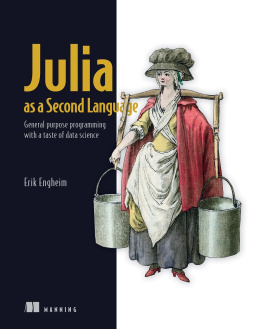

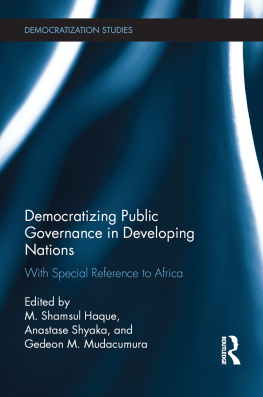
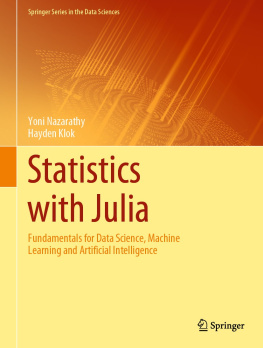
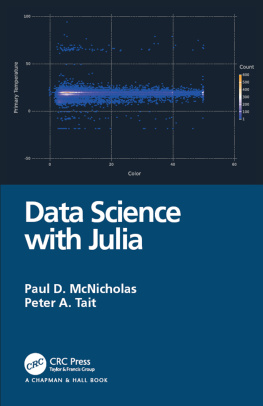

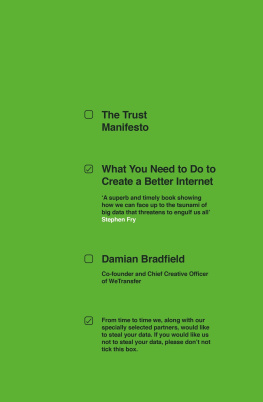
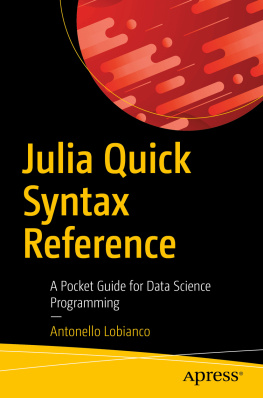
![Zacharias Voulgaris PhD [Zacharias Voulgaris PhD] - Julia for Data Science](/uploads/posts/book/119586/thumbs/zacharias-voulgaris-phd-zacharias-voulgaris-phd.jpg)
